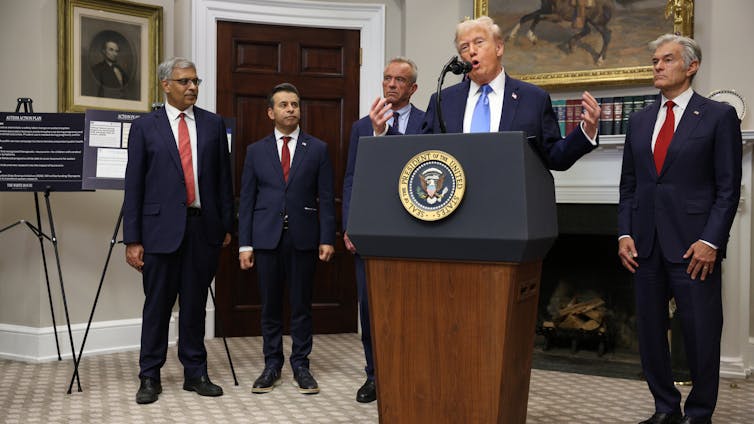Opinion
To revive Labour, Starmer should go to conference with this pledge: we will clean politics of sleaze | Polly Toynbee
Read more on post.

Money, money, money brings politicians down time and again. People expect corrupting cash from the Tories, with their last cabinet of zillionaires umbilically linked to finance of every kind, but voters expect better from Labour. The first painful dent in the moral armour of Keir Starmer’s cabinet was the revelation of freebies he and others accepted in clothes, glasses and tickets. There was a chance then to get on the front foot, using that minor but shabby embarrassment to declare a great clean-up of the sewage inflow of influence on politics from mega donations. But No 10 missed it.
The dispute over Labour’s alleged failure to declare sizeable support from the campaign group Labour Together offers another opportunity for Starmer to call time on big money in politics. The Tories have called for the electoral commission to conduct a new investigation into this week’s allegations – including that Labour failed to declare staffing costs it received from Labour Together that covered McSweeney’s salary. In 2021, the watchdog fined Labour Together £14,250 for failing to properly declare sizeable donations, which the campaign group blamed on an “administrative error”. Labour has clarified this week that McSweeney’s salary was paid by Starmer’s leadership campaign in 2020, not Labour Together.
But that’s not the point. Few will follow tortuous points of law. Every time people are reminded of eye-watering sums swashing about in our politics, they rightly think it stinks. And it does, even when all the rules are followed. There’s no way of knowing what, if any, influence donations have, but the public understandably assumes that some donors expect something in return. Even if they asked for nothing in return, why should the preferences of the wealthy swing our elections?
Cash for honours has contaminated parliament since the dawn of time. “Dark money” finds loopholes in the law. According to analysis last year, almost £1 in every £10 donated to parties and politicians comes from unknown or dubious sources: cash from companies that have never turned a profit, from unincorporated associations that do not have to declare their funders and banned donations from overseas donors via intermediaries, enters the system.
A £75,000 donation to Robert Jenrick was mired in controversy after it was revealed that the donation was given by a company that financed it through a loan from a business registered in the Virgin Islands (Jenrick said the donation was “perfectly legal and valid”). But never mind what’s hidden when broad daylight is no disinfectant to the influence wielded by a rich minority. Between 2001 and 2021, a fifth of all donations to UK political parties came from just 10 big donors. While cash for honours is illegal, wealthy Conservative benefactors who donate more than £3m to the party have found themselves getting seats in the House of Lords.
The fright of Elon Musk’s rumoured threat to donate $100m (£78m) to Reform should be enough to jolt the government into action. Musk can legally do this via the profits from his UK company. There is nothing to prevent a single man abroad from nearly doubling the total donations to UK political parties, which stood at £100m in 2024. The Committee on Standards in Public Life has previously called for an annual donation cap of £10,000 for individuals and organisations, covering expat donors too. The cash that flows in from them needs to be registered: currently, as Justin Fisher writes in Political Quarterly, there is no data available on how much they donate.
Capping all donations to £10,000 would require state funding to fill the gap. Party membership fees will never cover what parties need to run headquarters and public meetings, recruit policy researchers, administrators, local organisers for elections and selections, conferences, leaflets and social media. Democracy relies on party volunteers, but they need professional organisers, too. Taxpayers may not like it, but put the choice to people straight: would you rather a small subvention from the state of around £100m, or in this time of power-crazed mega masters of the world’s wealth, will you leave it to the likes of Musk to buy up political parties as they buy up everything else? Few people think democracy should be up for sale, which is why a majority of the public supports a cap on party donations. That £100m is a tiny price to pay for politics uncontaminated by cash.
Labour’s reliance on trade union funds need be no block on reform. Making all donations personal, not institutional, wouldn’t break the fundamental link between Labour and the unions that created the party. Ending unsavoury threats by unions to defund Labour would be cleansing for both. Sharon Graham, the general secretary of Unite, Labour’s biggest single donor, does her union, unions in general and the Labour party no favours when, like an old family matriarch, she threatens to cut funding to the party when it displeases her. Labour’s far-reaching workers’ rights bill is constantly slandered by the right as payback for union funds: it isn’t. It’s strongly supported by cabinet, party, and above all the public – but the sniff of “union paymasters” harms one of the government’s best policies.
Canada limits yearly donations to $3,450 per voter. The rest of the bill is picked up by the state, which pays for 62% of the cost of running parties. That’s what clean politics looks like (though even on that low limit, campaigners protest that donations are too swayed by the wealthy). Labour should take heed. If it makes a clean break, and goes with the grain of public opinion, it might begin to dispel public disgust with politicians wooing the rich.
after newsletter promotion
How to do it? Public funds could be allocated according to the public vote at the election. (Reform got 14.3%). Helena Kennedy’s power commission a few years back contained an ingenious plan, where every voter would tick a separate box on the ballot paper to allocate their share of public funding to the party of their choice: with so much tactical voting, this would give funds to minor parties. However it’s done, now would be a moment for boldness. Labour is low in the polls, and risks getting caught up in a sleaze scandal. Its route out of this Westminster morass should be a plan to clean up politics.
-
Polly Toynbee is a Guardian columnist
Opinion
Will he? Won’t he? Do the King of the North’s antics remind you of anyone? | Marina Hyde
Read more on post.

“Whenever Westminster has gone into a moment,” Andy Burnham lamented in one of his many interviews this week, “I have somehow been drawn into it.” Yeah, we’re all trying to find the guy who did this. Why is this happening to Andy Burnham, this fevered speculation that Labour’s Iron Throne has his name on it, which is now causing cabinet ministers, the prime minister and maybe even the bond markets to overtly or covertly slag him off? “I think what we’ve got to do,” Andy thought in another interview, “is to stop the sense in Westminster at times that everything is in flux.” Counterpoint: the sense in Westminster is that everything is completely and utterly fluxed. The wider country is considerably less optimistic.
Yet is Andy Burnham the answer? The Greater Manchester mayor would certainly appear to reckon so, having worked tirelessly this week to give himself pre-title billing at his party’s imminent gathering in Liverpool. Yup, here he comes – the King of the North, the cock of the conference, the memoji of Manchester – as unafraid to chat shit to those bond markets as he was to give that press conference in that jacket in that pandemic. The worry is that Andy is just one of those things that, during Covid, people thought were very good, but now realise are actually very bad. Like incipient alcoholism or Ted Lasso.
Maybe Burnham is less bad than Keir Starmer, which isn’t exactly the Kitemark, but also not the same as having a plan. Certainly, nobody is as bad as Britain’s problems, which is the main light flashing on the dashboard, and none of Burnham’s proposals thus far – some nationalisation and some wealth taxes – touch the sides of them.
In fairness, he’s not offering a policy platform at this stage, the stage where he’s implying he wants to be prime minister, not how he wants to be prime minister. It’s more of a vibe – if not to all tastes within the parliamentary Labour party. Consider the MP who told HuffPost: “Keir should say to him, ‘Any time you want, Andy, there’ll be a seat for you, and I want you in government.’ He’d shit himself. People would see how useless he is.” Housing secretary Steve Reed is another one who seems somehow unkeen on Andy making a conference entrance like the North Face Kylo Ren, describing Burnham as a “regional politician”, and warning against the risk of division. Risk division at this upcoming Labour conference? No spoilers, but it’s just possible we might have passed that particular event horizon.
Disappointing interjections like these seem to have been part of what sent Burnham back to the microphone: “I gave an honest answer and sometimes it feels to me that the Westminster world can’t deal with those answers.” Yeah, they can’t handle his truth. This is the Westminster world in which Burnham previously served loyally as a Blairite, a Brownite, a Corbynite and even a Starmerite, but he’d like you to know he’s been a long time out of that … swamp, would you call it? Certainly the insult “Westminster” is recurring increasingly often in Burnham’s pitch. I can’t bear the thought of him finding out where he’s going to have to work if his dream comes true.
Then again, despite the week bringing this new drama, it’s hard for anyone who has lived through the past decade of political turmoil in the UK not to feel there are at least familiar elements here. Having extracted my memories of the 2017 and 2018 Conservative party conferences from the coffin of earth I’d nailed them into, I am transported back to those times when some guy made both events absolutely all about him and his will-he-won’t-he leadership bid. As you might recall, the guy was Boris Johnson, fannying about like the blancmange Uncle Scar, driving half the attenders mad with political lust and the other half just mad. The then Henley MP John Howell spoke for a significant chunk of his colleagues at the 2017 Tory conference when he said: “My message to Boris is to keep his bloody mouth shut.” By the 2018 conference, many had become so openly weary of the Johnson manoeuvring that Howell ramped up to: “As far as I’m concerned, Boris can just fuck off.” In the 2019 Conservative leadership contest John Howell would vote – obviously, obviously – for Boris Johnson. Henley is currently represented by the Liberal Democrats.
after newsletter promotion
This is the country we’ve lived in for a very, very long time now – a place of endless churn, trending in the direction of seismic. We either get inadequate chancers (eg Johnson or Liz Truss) or chance inadequates (eg Theresa May, Rishi Sunak or Keir Starmer), all of whom are forever being presented as the next true hope. We last drew one off the chance-inadequates pile, so maybe next time round it’s fated to be an inadequate chancer – a casting call Nigel Farage could definitely nail.
Andy Burnham belongs to the other pile, I think. But after the past week, and forgive this dip into Premier League history books, I now find it impossible to hear him giving it the full King of the North without thinking of Alex Ferguson’s dismissal of Paul Ince as a “big time Charlie”. Alas, some associative synaptic glitch means I now cannot hear the words “King of the North” without my brain changing them into “the Guv’nor” – a nickname that Ince bestowed upon himself, admittedly, while Andy’s was fitted to him by the media. And you know, Ince was probably underrated – don’t write in – so maybe that bodes well …
Even so, I did feel a tightening in my jaw when Andy informed the BBC this week that a tilt at the top job would need to be “more than a personality contest”. A personality contest between Keir Starmer and Andy Burnham? I guess we are where we are.
-
Marina Hyde is a Guardian columnist
Opinion
Why scientists may be fearful of speaking out about Trump’s autism claims
Read more on post.
“Are you making good health decisions?” reads one Robert F. Kennedy Jr. meme on social media, a slogan printed against an image of a smiling US health secretary. Such social media posts invariably invite lively comments beneath them, but the situation is deadly serious.
On 22 September, Donald Trump and RFK Jr. publicly proposed a link between paracetamol – commonly referred to in the US by the brand name Tylenol – and autism. The paracetamol link has also been shown, through rigorous research, to be false.
It’s far from the first falsehood about science to be presented at the highest levels of the US government. While RFK Jr. denies being anti-vaccination, he has repeatedly stated debunked claims about supposed vaccine harm.
The highly politicised nature of such claims and the current political environment may lead to a reluctance among some scientists to speak out publicly. But it’s imperative that they continue to defend science in the public arena.
With wall-to-wall coverage of such issues, it is easy for the considered views of experts to get drowned out – and headlines rarely lead with the perspectives of researchers. The speed of the news cycle can also mean that the story has moved on by the time they are in a position to comment.
Science communicators weigh up the published evidence on a topic of controversy, factoring in multiple perspectives. They also talk about when science gets it wrong – and when retractions of journal articles are needed.
Toxic environment
But online toxicity and hostility on social media have increased to the extent that both scientists and, indeed, science journalists have a real fear of writing about topics even where they have strong expertise. And with the US government making major cuts to research funding and targeting politicised areas such as climate science in particular, some may be inclined to stay quiet or self-censor to avoid losing their grants.
We’ve also seen government scientists removed from their positions by the Trump administration. In June 2025, RFK Jr. removed all 17 members of a committee that issues official government recommendations on immunisations.
In August 2025, the director of the US Centres for Disease Control and Prevention, Susan Monarez, was fired for what she says was refusing to dismiss vaccine policy officials. The health secretary says it was because he didn’t trust her.

FRANCIS CHUNG / POOL
Political decisions such as these and others can have a chilling effect on scientists and the media, where commentators may feel the need to tread carefully. Yet this makes it all the more urgent that everyone involved in communicating science to the public ups their game and defend expertise.
Nevertheless, when the politics are combined with the toxicity of debate in the public sphere, particularly on social media, it can make conveying expert opinions very challenging. Science communicators have often developed valuable and thoughtful methods to put the message across to the public.
Platforms like Bluesky, which give users greater control over their interactions, have been one such attempt for a civil space to discuss science. Yet, on other platforms, it is easy to see how valuable efforts such as these could sour amid the kinds of vitriolic attacks come from anonymous sources who seem to act with impunity online.
There is arguably a place to fight fire with fire, including with the use of ridicule. Examples include California governor Gavin Newsom’s mockery of Trump tweets or South Park satirising the US administration in the basest of fashions.
The longer-term goals in controlling false scientific statements involve increasing media literacy, prebunking– debunking myths and conspiracy theories before they spread rapidly – and setting out “nudge” effects, where there are several choices offered to people that eventual lead to a change of behaviour, as happens in advertising.
If a scientific or innovation programme has the resources, subvertising techniques – where spoofs and parodies of corporate ads are created to critique their messages – have been used effectively against the tobacco lobby and oil companies.
It may help for professional bodies, universities and other institutions involved in communicating science to maintain vigilance on contentious claims so that they are well prepared when these topics blow up in the media. The tylenol-autism claim is not something that had been widely shared in mainstream publications before now. But science communicators should be ready for the next time it comes up.
Opinion
Sauna competitions have gone from dangerous endurance to therapeutic showmanship

Read more on post.

When the British Sauna Society promises “multisensory theatre and dazzling skills” at the national Aufguss championships, you might wonder what on earth they’re talking about. The German word Aufguss means “infusion”, but don’t let that fool you into thinking this is some gentle aromatherapy session.
The idea of a sauna “championship” is likely to conjure visions of stubborn people engaging in dangerous endurance contests. Thankfully, Aufguss is nothing like that. Instead, it’s more akin to figure skating than speed skating – a choreographed performance where infusion masters compete to create the most immersive sauna experience.
These Aufguss meisters combine carefully selected essential oils, which they aerosolise on hot stones, with music and light shows while skilfully manipulating the steam using towels and body movements.
Their ten-to-20-minute performances are judged on professionalism, heat distribution, waving techniques, fragrance usage, theme implementation, atmosphere and team spirit – yes, audience participation is expected.
But is this theatrical sweating actually good for you? The health benefits are surprisingly substantial. Sauna use is a form of passive heat therapy that typically involves multiple sessions of five to 20 minutes followed by cooling activities. Studies often report reduced blood pressure and lower cardiovascular disease risk, along with decreased inflammation throughout the body.
The reason lies in how repeated heat exposure challenges our cardiovascular system in a similar way exercise does. When we’re exposed to extreme temperatures, our bodies redistribute blood from core organs to the extremities, such as the arms and legs, where the increased surface area helps dissipate heat more effectively. Blood vessels in our skin dilate to bring heat closer to the surface, while our hearts work harder to pump blood around this expanded network.
There’s even evidence that regular sauna use prepares us for our warming planet. Heat acclimatisation increases blood volume, creating a sweat reserve we can access at lower core temperatures, promoting better cooling through evaporation – a handy adaptation given the inevitable increase in heatwaves we’ll face, thanks to the climate crisis.
The aromatherapy element adds another layer of benefit. While often dismissed as fringe medicine, there’s growing evidence that essential oils like lavender can be beneficial for mental health by reducing depression and anxiety. Music, too, has demonstrable mood-altering effects, with certain frequencies shown to reduce blood pressure and slow heart and breathing rates.
However, nature gives with one hand and takes with the other. Recent research shows that while heat exposure makes us resilient, it also accelerates biological ageing. Still, this seems a reasonable trade-off compared to the alternative.
Old-school sauna championships were less salubrious
The alternative, sadly, was demonstrated at the old competitive sauna world championships. Unlike today’s artistic Aufguss competitions, these events tested pure endurance – whoever stayed longest without collapsing won. This dangerous format inevitably ended in tragedy when a finalist died and another nearly perished at the 2010 championships. Unsurprisingly, it was the last time such an event was held.
The difference is crucial. Our bodies constantly generate heat through metabolism, and in normal temperatures we lose it through radiation, conduction, convection and evaporation.
In extreme heat, most of these mechanisms become ineffective, except evaporation – hence, sweating becomes critical. Curiously, one rule of the old endurance competitions forbade wiping sweat away, essentially sabotaging the body’s primary cooling method.
When heat exposure continues beyond our cooling capacity, core temperature rises above 40°C. Here, the body is on a point of no return as heat generated by metabolism increases. The chemical reactions keeping our cells alive begin breaking down, leading to organ failure and ultimately death.
Which brings us back to the choice between two very different types of competitive sauna. One celebrates skill, artistry and the therapeutic benefits of controlled heat exposure, combined with aromatherapy and music. The other was a deadly test of stubborn endurance that rightfully belongs in the dustbin of history.
I know which type of competitive sauna I prefer.
-
Politics3 days ago
European Parliament snubs Orbán with vote to shield Italian MEP from Hungarian arrest
-
Culture3 weeks ago
Life, loss, fame & family – the IFI Documentary Festival in focus
-
Health4 days ago
EU renews support for WHO’s Universal Health Coverage Partnership
-
Environment7 days ago
Key oceans treaty crosses threshold to come into force
-
Culture2 months ago
Fatal, flashy and indecent – the movies of Adrian Lyne revisited
-
Culture3 days ago
Twilight at 20: the many afterlives of Stephenie Meyer’s vampires
-
Culture1 week ago
Farewell, Sundance – how Robert Redford changed cinema forever
-
Culture3 weeks ago
What is KPop Demon Hunters, and why is everyone talking about it?










































